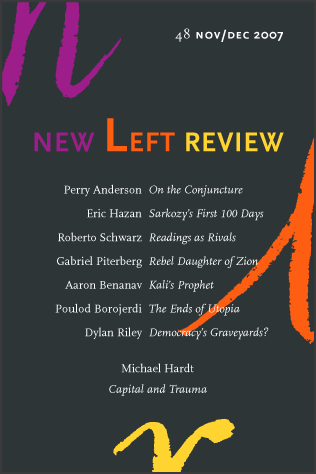A reckoning of global shifts in political and economic relations, with China emerging as new workshop of the world and US power, rationally applied elsewhere, skewed by Israeli interests in the Middle East. Oppositions to it gauged, along with theoretical visions that offer exits from the perpetual free-market present.
Principally known for works on totalitarianism and the Eichmann trial, Hannah Arendt’s powerful and prophetic critiques of the Zionist project, written in the 1940s, have rarely been discussed. Gabriel Piterberg tracks the evolution of this brave and independent thinker.
Dispatches from France during Sarkozy’s first hundred days. In the Elysée, echoes of a Giscardian ‘change of style’; among the Socialists, a programmatic disarray compounding a long heritage of desertions; in the streets, immigration raids, counter-demonstrations, and hints of an embattled everyday resistance.
Roberto Schwarz discusses the cultural-political import of rival interpretations of Machado de Assis, within the critical space of world literature. Local versus international, specific versus universal, entangled within the ironies and dizzying narrative disjunctures of a Brazilian master.
Poulod Borojerdi on Fredric Jameson, Archaeologies of the Future. Magisterial summation of a lifetime’s engagement with Utopia as literary form and political programme.
Dylan Riley on Michael Mann, The Dark Side of Democracy. A bold theoretical construction of causal relations between democratization and genocide, tested through detailed historical studies.
Aaron Benanav on Thomas McCraw, Prophet of Innovation. A Schumpeter for post-Keynesian times? Professional trajectory and personal tragedies of the theorist of creative destruction.
Michael Hardt on Naomi Klein, The Shock Doctrine. Neoliberal transformations, from Chile to occupied Iraq, as instances of a ‘disaster capitalism’ enabled by socio-economic and ecological trauma.
